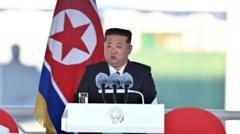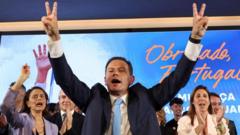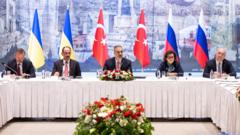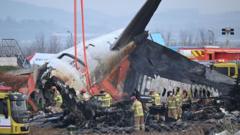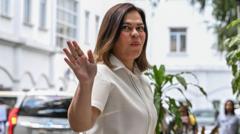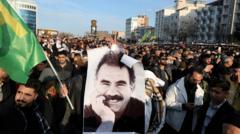South Korea has officially removed President Yoon Suk Yeol from office following a unanimous decision from the Constitutional Court to uphold his impeachment. As citizens celebrate and mourn this historic verdict, the nation grapples with a politically fractured landscape and mounting demands for constitutional reform as a new leader must be elected within two months amidst ongoing suspicions of political corruption and conspiracy theories.
South Korea Faces Uncertain Future After Impeachment of President Yoon Suk Yeol
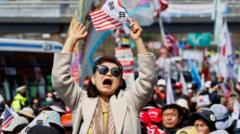
South Korea Faces Uncertain Future After Impeachment of President Yoon Suk Yeol
The recent ousting of President Yoon Suk Yeol triggers political turbulence and public division in South Korea.
South Korea's political landscape has been left shaken as President Yoon Suk Yeol was removed from office by the Constitutional Court, marking a significant moment in the nation’s history. The unanimous ruling was a culmination of Yoon's impeachment by parliament in December, which arose in response to his controversial attempt to impose martial law. The court’s verdict, which came on Friday, prompted a mixture of celebrations and lamentations throughout Seoul as the implications of this decision began to settle in.
With the need for a snap election to appoint a new president by June 3, South Koreans are faced with the task of moving on from what has been a tumultuous period. Yoon's presidency will be remembered for the chaos that ensued during a six-hour martial law declaration, an event that jolted the collective memory of the nation and evoked fears reminiscent of their past under authoritarian rule.
The Constitutional Court was harsh in its assessment of Yoon's actions, describing the military intervention as unjustified and detrimental to the democratic principles foundational to South Korea’s governance. While many citizens welcome the ruling as a win for democracy, the political fallout continues to thrive, revealing a nation deeply divided.
Yoon's departure leaves behind a polarized environment, exacerbated by his steadfast denial of wrongdoing and his framing of the political opposition as “anti-state forces.” This rhetoric has taken root among certain factions of the public, transforming the former president into a figure of martyrdom for those who view him as a victim of political machinations.
As crackdowns on legitimacy and trust in government institutions loom, a third of the population expresses skepticism towards the Constitutional Court, while confidence in electoral processes wanes. This pervasive distrust sets the stage for the upcoming election, with immense pressure on the new leader to heal a bitterly divided nation that has remained without a functioning head of state for several months.
Amidst ongoing tensions, South Korea faces critical challenges on the international front, particularly concerning relations with the United States amidst President Trump's tariffs and the ongoing North Korean crisis. As the nation moves forward in the wake of this monumental court ruling, it must reconcile immediate political challenges with the ongoing legacy of Yoon’s presidency, all while a divided public braces for the new election season.
The future remains uncertain as the political landscape shifts, setting South Korea on a path that could redefine its institutions and leadership dynamics for years to come.


